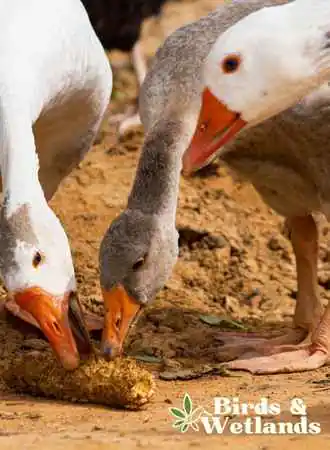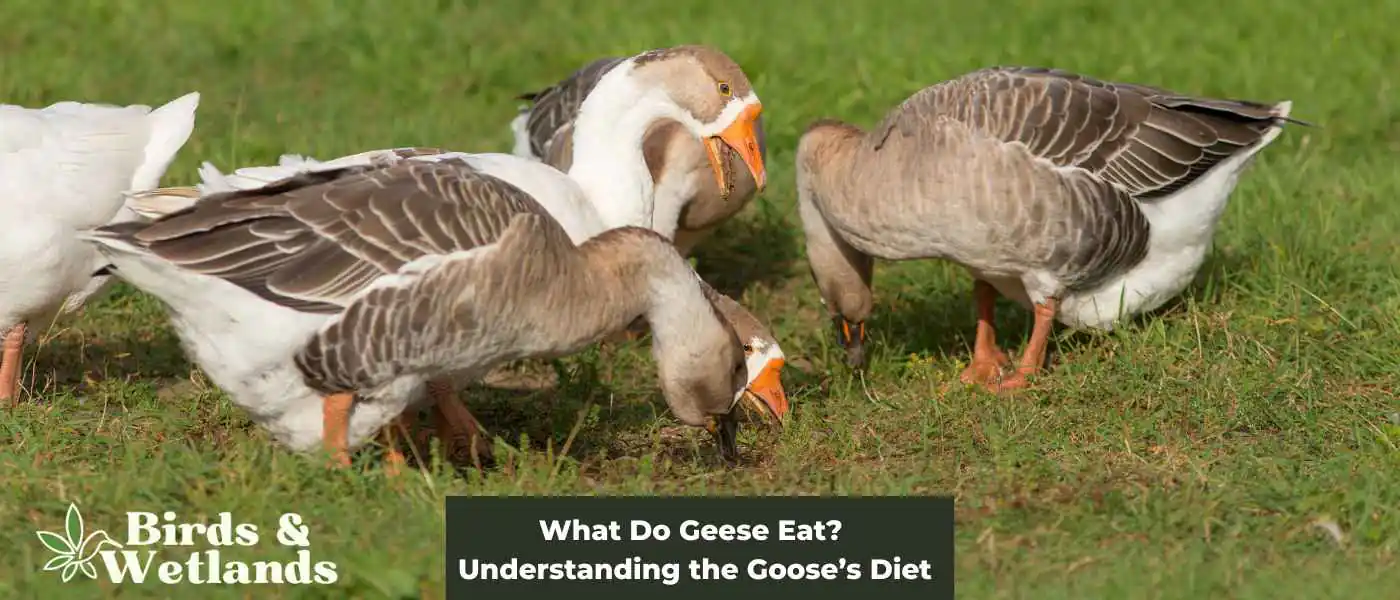If you have seen a goose, you know that they can be quite large. But have you wondered — what do geese eat?
Goose are omnivorous by nature, meaning they feed on both plants and animals. However, they prefer plant material to meat, that’s they are considered herbivores.
In the wild, geese typically eat grasses, seeds, berries, small invertebrates, and fish, among other foods. Domesticated geese also have a varied diet consisting of grains, vegetables, fruits and commercial feeds.
Key Takeaways
What do Canadian geese eat?
Water plants are the main source of nutrition for Canada geese in their natural environment. These birds primarily consume aquatic vegetation, such as sedges, pondweeds, and wild rice. While they will consume other plant material if available, Canadian geese prefer water plants due to their high protein and nutrient content.
In addition to aquatic plants, Canada geese consume small amounts of insects and other arthropods. These food sources enable them to obtain the protein and other nutrients necessary for their health.
Although Canadian geese are not typically regarded as pests, their feeding habits can be problematic for humans. When these birds feed on agricultural grains, crops or grasslands, they can cause plant damage and reduce their aesthetic appeal.

What do you feed geese in the wild?
Geese are frequently seen as a nuisance, particularly when congregating in city parks and other public areas. One of the most frequent complaints is that they beg for food, and people frequently feed them bread in response.
However, bread is not a natural or healthy food for them, and feeding geese bread can be detrimental. In addition to being high in carbohydrates, bread lacks many of the nutrients, vitamins and minerals geese require. Uneaten bread left in feeding areas can become moldy and attract rodents.
Instead of bread, you can feed the Canada goose with nutritious food. For instance, you can offer small piles of cracked corn or cat food. You can also offer baby and adult geese different foods, such as vegetable peels and winter wheat.
Do wild geese eat grass?
Adult and young geese are opportunistic foragers. These birds and other waterfowl will eat just about anything they can get their beaks on. But their favorite food is grass.
Geese’s regular diet includes various grasses, both wild and cultivated. The serrated edges on their bills make pulling and cutting grass easy. Due to the lack of teeth, they swallow the grass whole.
There’s no question that geese love grass. It is an excellent source of vitamin A, which is essential for good vision and immune system function. Additionally, grasses are packed with nutrients that help geese stay healthy and strong.
The fibrous nature of grass helps geese to digest their food properly. In short, there are many good reasons why wild geese love eating grass.

Do geese eat sunflower seeds?
While most geese will eat almost anything you offer them, some of them are actually picky eaters. So when it comes to sunflower seeds, some geese like the taste of sunflower seeds, while others find them too bitter or not worth the effort of shelling. However, most geese will at least try these seeds if they are available.
If you want to attract geese to your yard or garden, offering small quantities of these seeds might be worth a shot. Just don’t be surprised if some of the birds reject the offering.
Do geese eat grains?
Yes, you can even see geese feeding grains in fields. Whole wheat is one of the most popular grains among geese. It is relatively easy to digest and contains nutrients that keep geese healthy.
Oats are another grain that geese enjoy because it contains fiber and minerals. Furthermore, geese enjoy eating corn, a good energy source. While geese will eat almost any grain, these are a few of their favorites.

What should you not feed a goose?
Bread
Feeding bread to geese is a popular pastime in parks and public spaces, but it harms the birds. Bread is not a natural part of a goose’s diet, and too much can cause health issues.
Bread-fed geese tend to become overweight, putting strain on their legs and feet. Furthermore, the high carbohydrate content of bread can cause liver damage.
Bread rots quickly in water, and when geese eat it, they can consume harmful bacteria that cause gastrointestinal issues.
It is best to avoid feeding geese bread for all of these reasons. They will enjoy plenty of other foods just as much that will not harm their health.
Processed Meats
Processed meats are not only bad for human health but also for geese’s health. Processed meats contain a lot of salt and fat, which can cause obesity and heart disease in geese. Furthermore, processed meats frequently contain harmful chemicals and preservatives that can harm the liver.
Sugary Foods
Sugary foods are appealing to geese, but they can be harmful to their health. Sugary foods can lead to obesity and diabetes in geese, heart disease and other problems. Furthermore, sugary foods can upset the natural balance of geese’s digestive systems, resulting in diarrhea and other health issues. Geese that consume sugary foods live shorter lives than those that do not.

Salty Foods
Salty foods are harmful to geese for several reasons. For starters, salt is required to function many biochemical processes in the body properly, and too much salt can disrupt these processes.
Excess salt, in particular, can disrupt the balance of electrolytes in the blood, leading to dehydration and other health issues.
Furthermore, salt contributes significantly to water retention, leading to the inability to fly and other mobility issues. Salt can also damage geese’s feathers, making them more vulnerable to cold weather and predators.
What do geese eat before they migrate in the winter?
Geese migrate in the winter and spring. They will fatten up before migrating south for the winter by eating a lot of food. Their diet consists primarily of grasses and other plants found in wetlands and open areas. They will also eat acorns and nuts in the autumn to conserve energy for their long journey. All the geese that migrate eat roughly four times as much food before migrating as they do the rest of the year. This increase in food consumption aids in accumulating extra fat reserves, which they will use for energy during their migration. Geese and other birds can make the long flight to their destination without stopping for frequent meals if they fatten up before winter.
What do baby geese eat?
Baby geese, like their parents, are herbivores. They primarily eat plants, such as leaves, grasses and berries. However, they will also consume small insects, such as ants and beetles.
The exact composition of their diet depends on the time of year and food availability. They eat mostly plants when plant life is more abundant in spring and summer. In the fall and winter, they will eat more insects when insect populations are higher.

What do geese eat in urban areas?
Most people have seen geese waddling through city parks and golf courses, but few know what these birds actually eat. While geese are commonly associated with open fields and ponds, they are adaptable and thrive in cities where they can easily find food. Variety is the key to a healthy diet for city geese. Geese eat insects, earthworms, and even food scraps from garbage cans in addition to grass and other plant life.
What do domestic geese eat?
Domestic geese are often fed with layers pellets, leafy greens, fruits, and grains. This diet ensures that they get the nutrients they require to stay healthy.
Layer pellets, which should not be confused with layers mash, are essential to a goose’s diet because they balance protein, fat, and carbohydrates. Another important component is leafy greens, which are high in vitamins and minerals.
Fruits and grains can also be beneficial because they contain additional essential nutrients.
Generally, providing domestic geese with various nutritious foods is critical to give them the best chance of remaining healthy.

Do geese eat all day?
Most people picture geese swimming gracefully in a pond or waddling around a park when they think of geese.
Many people are unaware that geese are extremely adept at finding food and spend half of their waking time day feeding. Geese spend roughly half of their day in the wild feeding on land and water.
They will consume a wide range of plants and small animals, depending on what is available in their environment.
Everything from grass to insects to small fish can fall into this category. Geese will graze on smaller snacks throughout the day in addition to their regular meals.

